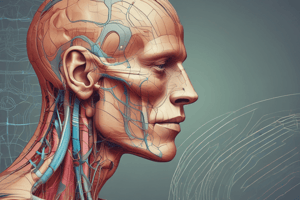Podcast
Questions and Answers
What is the primary function of the hearing centers in the brain according to the passage?
What is the primary function of the hearing centers in the brain according to the passage?
- To create electrical impulses that are sent to the auditory nerve
- To interpret the electrical signals received from the auditory nerve as sound (correct)
- To amplify the signals received from the auditory nerve
- To give meaning to the sounds received from the auditory nerve
What is the key difference between hearing impairment and deafness as defined in the passage?
What is the key difference between hearing impairment and deafness as defined in the passage?
- Deafness is a permanent condition, while hearing impairment can be temporary or fluctuating
- Hearing impairment involves an inability to process linguistic information, while deafness does not
- Individuals with deafness are not included in the definition of hearing impairment (correct)
- Hearing impairment adversely affects educational performance, while deafness does not
According to the passage, which of the following is NOT a common cause of temporary hearing loss?
According to the passage, which of the following is NOT a common cause of temporary hearing loss?
- Fluid in the middle ear
- Narrowing of the ear canal
- Genetic mutations (correct)
- Eardrum perforation
What is the most common cause of permanent hearing loss mentioned in the passage?
What is the most common cause of permanent hearing loss mentioned in the passage?
According to the passage, what is the key characteristic that distinguishes individuals with deafness from those with hearing impairment?
According to the passage, what is the key characteristic that distinguishes individuals with deafness from those with hearing impairment?
Which of the following is NOT listed as a common cause of temporary hearing loss in the passage?
Which of the following is NOT listed as a common cause of temporary hearing loss in the passage?
Which of the following is NOT a major part of the ear?
Which of the following is NOT a major part of the ear?
What is the main function of the Eustachian tube in the middle ear?
What is the main function of the Eustachian tube in the middle ear?
What is the primary function of the cilia (tiny hair cells) in the inner ear?
What is the primary function of the cilia (tiny hair cells) in the inner ear?
What is the role of the eardrum (tympanic membrane) in the hearing process?
What is the role of the eardrum (tympanic membrane) in the hearing process?
Which of the following structures is responsible for transmitting sound signals from the inner ear to the brain?
Which of the following structures is responsible for transmitting sound signals from the inner ear to the brain?
What is the primary function of the three tiny bones (ossicles) in the middle ear?
What is the primary function of the three tiny bones (ossicles) in the middle ear?
Study Notes
The Ear and Hearing
- The ear is the organ of hearing, composed of three major parts: the outer, middle, and inner ear.
- The outer ear includes the external visible part (pinna) and the ear canal, which receives sound waves from the environment.
Sound Transmission
- Sound waves travel through the ear canal and reach the eardrum (thin membrane that separates the outer ear from the middle ear).
- The eardrum vibrates, making the three tiny bones (ossicles) in the middle ear move together to transmit sound.
- The middle ear is filled with air, and for optimal hearing, the air pressure inside the middle ear and outside the ear needs to be the same.
Inner Ear and Hearing Centers
- The inner ear includes the cochlea, tiny hair cells (cilia), and the auditory nerve, which travels from the inner ear to the brain.
- The vibration of sound waves causes the cilia to move, creating electrical impulses sent to the brain via the auditory nerve.
- The hearing centers in the brain interpret these signals as sound and give them meaning.
Hearing Impairment and Deafness
- Hearing impairment refers to an impairment in hearing, whether permanent or fluctuating, that adversely affects a child's educational performance but is not included under the definition of deafness.
- Deafness is a hearing impairment that is so severe that the child is impaired in processing linguistic information through hearing, with or without amplification, and adversely affects a child's educational performance.
Causes of Hearing Impairment/Hearing Loss
- Temporary hearing loss is often caused by fluid in the middle ear, eardrum perforation, narrowing of the ear canal, or excessive ear wax.
- Permanent hearing loss can be caused by genetic, infectious, drug-related, physical trauma, or structural causes.
- Genetics is the most common cause of permanent hearing loss, accounting for over half of all cases in infants.
Studying That Suits You
Use AI to generate personalized quizzes and flashcards to suit your learning preferences.
Description
This quiz covers the basic anatomy of the ear and its three major parts: the outer, middle, and inner ear. Learn about how sound waves are received by the pinna, travel through the ear canal, and reach the inner ear. Understanding these concepts is essential before studying hearing impairments.




